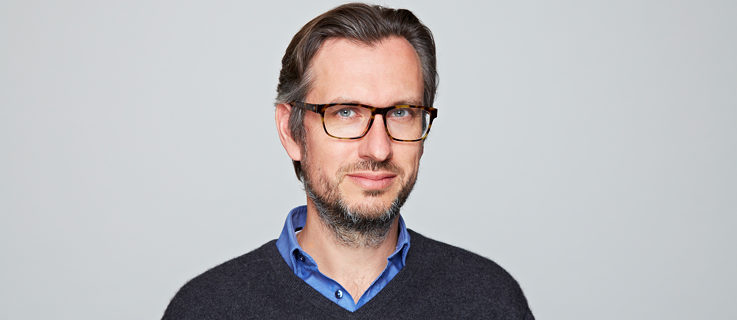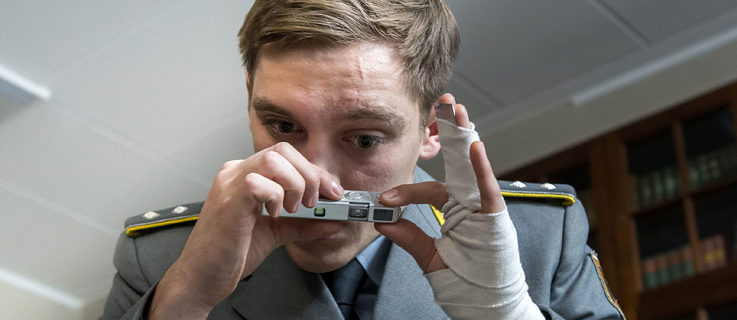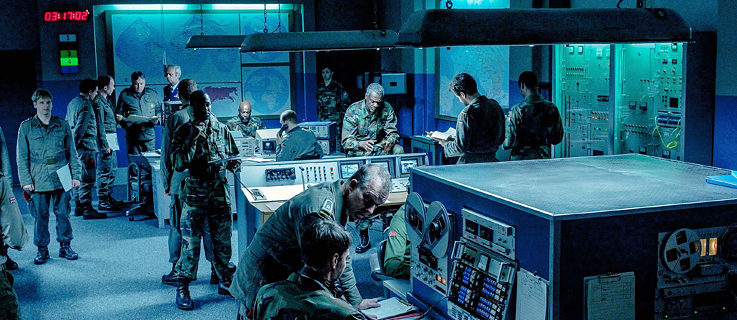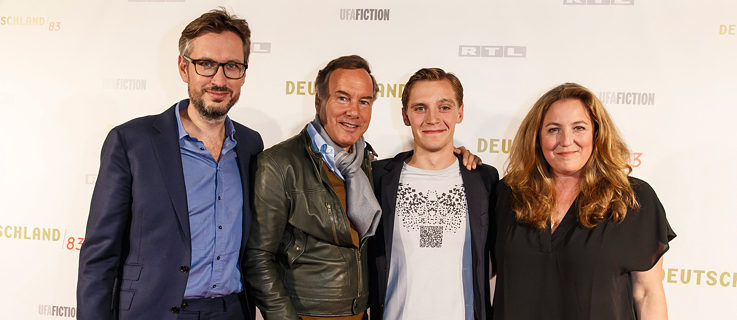Deutschland 83: Interview with producer Jörg Winger
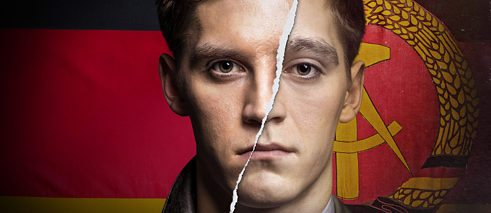
Goethe-Institut London: What can you tell us about the conception and development of Deutschland 83? What was the idea behind it?
Jörg Winger: The idea for Deutschland 83 came from my experiences in the 1980s when I was a conscripted Bundeswehr soldier in West Germany, intercepting messages from Russian troops in the GDR. The Berlin Wall had not yet fallen. I studied Russian for six hours a day and then we were put on big machines wearing big headphones and were asked to record important information. While we did this, we sometimes received messages back in which Russian soldiers greeted us personally. At that moment I realised that espionage always implies counter espionage.
I carried the story around with me for a while, wondering if I could make a comedy, crime story or thriller out of it. My wife Anna, with whom I co-created the series, had the idea of telling the story from the viewpoint of the mole - the GDR spy. That was the starting point. The year 1983 was chosen fairly spontaneously. It was the year in which German pop music became an international phenomenon - Nena’s 99 Luftballons went to No. 1 in the US and the Neue Deutsche Welle emerged.
It was only during our research that we realised how exciting 1983 had been politically. One of our military advisers told us that NATO had planned a big manoeuvre, simulating all movements of a nuclear escalation. In the heated atmosphere of the time, the Russians mistook this for a covert real nuclear attack and were sitting there with their finger on the button, considering whether they should shoot first. We were a hair’s breadth away from a nuclear catastrophe because the mutual mistrust was so deep. This historical background set the scene for us – the interplay between the flourishing of German pop and, on the world political stage, just having survived by the skin of our teeth.
Goethe-Institut London: So was it important to you that the series wouldn’t only be entertaining, but would also give insight into modern history?
Jörg Winger: Absolutely, yes. We spoke to Hans Otto Bräutigam, who was the West German ambassador to the GDR at the time. And with John Kornblum (former US Ambassador in Germany), who knew 80s West Berlin well. People knew they were living in a dangerous time but did not grasp quite how dangerous. We only really found this out by looking at declassified documents in autumn 2013.
Goethe-Institut London: Deutschland 83 shows us different ways of life in East and West Germany and, for the 45 minutes of each episode, rebuilds the Wall in the viewers’ minds. When you look at Germany 1983 and Germany 2016, what similarities, differences, and comparable challenges do you see?
Jörg Winger: I think overall it has become a much more modern, open and relaxed country. At least that is my impression. The Edel family in the series depicts a very patriarchal family structure that, in my opinion, is very much how it was in the 1980s: parents were strict, they were the children of Nazis and wanted to be good democrats but they still ruled in an authoritarian way. And then there were their children, who rebelled against them.
I feel that Germany has opened up and become much more liberal since then. It is also a country in which people speak their minds much more openly. This also means that the more extreme right-wing views become more visible. In relation to the current refugee crisis, I often wonder what it would have been like if one million Syrians had arrived in 1983s West Germany. I think reactions would have been much harsher.
You can also tell that Germany is talked about in a different way these days. As my wife is American, I have spent a lot of time in the US over the last 20 years and, in the beginning, many conversations ended up being about the Holocaust. Germany would often be discussed with a negative undertone. Now I think Germany’s image has turned into something positive. I am still surprised how often I hear people talk about Germany with a sense of admiration. Certainly Berlin as an international magnet has a lot to do with this. But it is probably also down to the changes in the European political landscape, making Germany a much more powerful player in the world.
Goethe-Institut London: As you know, the promotion of the German language is one of our main goals at the Goethe-Institut. So we are particularly pleased to see Deutschland 83 being shown here in the UK in German with English subtitles. Quite daring! Was it clear from the beginning, that you would show the series abroad in German and how did the decision come about?
Jörg Winger: I cannot take credit for the decision. As my wife is American, although her German is very good she writes in English, and so the whole writing process was in English. Afterwards I translated the screenplay back into German as it’s a German series commissioned by a German channel. It was never supposed to be an international series and we never expected it to go in that direction. It took on that dynamic after a colleague in London sent the English script to somebody at Sundance TV in the US. If the writing process had been in German, the script would have never made it to London or Los Angeles. We are so lucky that it just happened like that.
In terms of broadcasting, each channel decides if a show is dubbed or shown with subtitles. The English never use dubbing. But it was a great novelty that such a big channel decided to show a foreign language series at prime time – a bold decision by Channel4. I think it’s fantastic, but I didn’t personally have any influence on the decision.
Goethe-Institut London: Lastly, we have to ask if you can tell us a little bit about a possible sequel – “Deutschland 86”?
Jörg Winger (laughs): Deutschland 86… we are in discussions with the German channel RTL and Fremantle Media International, our London-based global distributor, with UFA Fiction and international TV channels. Unfortunately, I can’t say more at this point. We want to try, not at all cost, but there is definitely a desire to make a great second series. As soon as we feel we have something, we will continue.
Goethe-Institut London: We would be delighted and so would the British viewers. Thank you very much for talking to us!
Jörg Winger: Thank you very much.
Jörg Winger
UFA FICTION, Executive Producer
Jörg Winger, creator and executive producer of DEUTSCHLAND 83, has produced more than 300 episodes of multi-award-nominated prime-time series SOKO LEIPZIG (ZDF). Winger won an international Google/YouTube pitch with his crime channel TRIGGER. He sold the online series SERIAL KILLERS to RTL Crime, making it the first YouTube series to be sold to a German pay-television broadcaster. A new drama series based on Sebastian Fitzek’s thriller DAS JOSHUA-PROFIL is currently in development. Fitzek is one of the most popular German thriller authors at home and abroad.
Winger regularly gives lectures on the development and production of television series at Filmakademie Baden-Wuerttemberg in Ludwigsburg. He lives with his family in Berlin.
